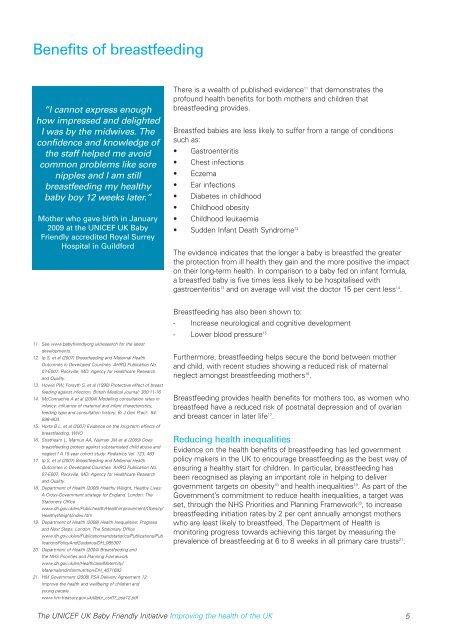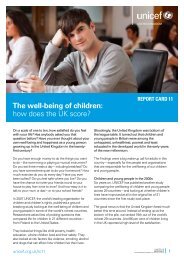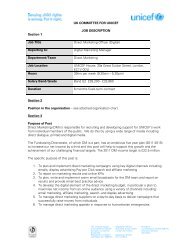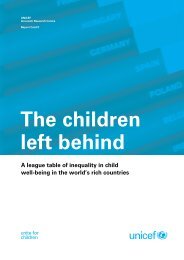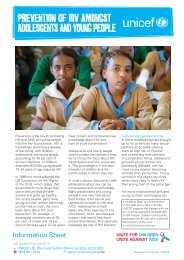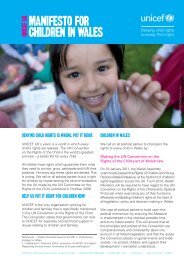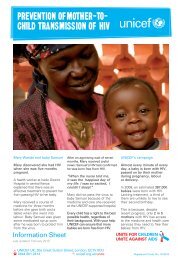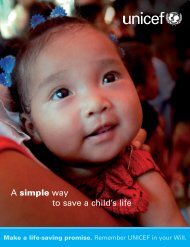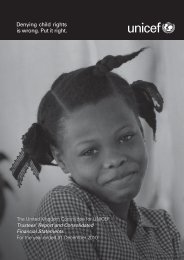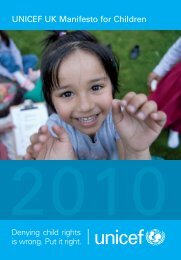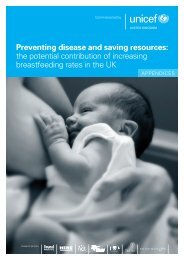The UNICEF UK Baby Friendly Initiative Briefing Paper 2009
The UNICEF UK Baby Friendly Initiative Briefing Paper 2009
The UNICEF UK Baby Friendly Initiative Briefing Paper 2009
Create successful ePaper yourself
Turn your PDF publications into a flip-book with our unique Google optimized e-Paper software.
Benefits of breastfeeding<br />
“I cannot express enough<br />
how impressed and delighted<br />
I was by the midwives. <strong>The</strong><br />
confidence and knowledge of<br />
the staff helped me avoid<br />
common problems like sore<br />
nipples and I am still<br />
breastfeeding my healthy<br />
baby boy 12 weeks later.”<br />
Mother who gave birth in January<br />
<strong>2009</strong> at the <strong>UNICEF</strong> <strong>UK</strong> <strong>Baby</strong><br />
<strong>Friendly</strong> accredited Royal Surrey<br />
Hospital in Guildford<br />
<strong>The</strong>re is a wealth of published evidence 11 that demonstrates the<br />
profound health benefits for both mothers and children that<br />
breastfeeding provides.<br />
Breastfed babies are less likely to suffer from a range of conditions<br />
such as:<br />
• Gastroenteritis<br />
• Chest infections<br />
• Eczema<br />
• Ear infections<br />
• Diabetes in childhood<br />
• Childhood obesity<br />
• Childhood leukaemia<br />
• Sudden Infant Death Syndrome 12<br />
<strong>The</strong> evidence indicates that the longer a baby is breastfed the greater<br />
the protection from ill health they gain and the more positive the impact<br />
on their long-term health. In comparison to a baby fed on infant formula,<br />
a breastfed baby is five times less likely to be hospitalised with<br />
gastroenteritis 13 and on average will visit the doctor 15 per cent less 14 .<br />
Breastfeeding has also been shown to:<br />
- Increase neurological and cognitive development<br />
- Lower blood pressure 15<br />
11. See www.babyfriendlyorg.uk/research for the latest<br />
developments.<br />
12. Ip S, et al (2007) Breastfeeding and Maternal Health<br />
Outcomes in Developed Countries. AHRQ Publication No.<br />
07-E007. Rockville, MD: Agency for Healthcare Research<br />
and Quality.<br />
13. Howie PW, Forsyth S, et al (1990) Protective effect of breast<br />
feeding against infection, British Medical Journal: 300:11-16<br />
14. McConnachie A et al (2004) Modelling consultation rates in<br />
infancy: influence of maternal and infant characteristics,<br />
feeding type and consultation history. Br J Gen Pract: 54:<br />
598–603.<br />
15. Horta B.L. et al (2007) Evidence on the long-term effects of<br />
breastfeeding. WHO<br />
16. Strathearn L, Mamun AA, Najman JM et al (<strong>2009</strong>) Does<br />
breastfeeding protect against substantiated child abuse and<br />
neglect? A 15-year cohort study. Pediatrics Vol. 123; 483<br />
17. Ip S, et al (2007) Breastfeeding and Maternal Health<br />
Outcomes in Developed Countries. AHRQ Publication No.<br />
07-E007. Rockville, MD: Agency for Healthcare Research<br />
and Quality.<br />
18. Department of Health (2008) Healthy Weight, Healthy Lives:<br />
A Cross-Government strategy for England. London: <strong>The</strong><br />
Stationery Office<br />
www.dh.gov.uk/en/Publichealth/Healthimprovement/Obesity/<br />
HealthyWeight/index.htm<br />
19. Department of Health (2008) Health Inequalities: Progress<br />
and Next Steps. London: <strong>The</strong> Stationary Office<br />
www.dh.gov.uk/en/Publicationsandstatistics/Publications/Pub<br />
licationsPolicyAndGuidance/DH_085307<br />
20. Department of Health (2004) Breastfeeding and<br />
the NHS Priorities and Planning Framework<br />
www.dh.gov.uk/en/Healthcare/Maternity/<br />
Maternalandinfantnutrition/DH_4071692<br />
21. HM Government (2008) PSA Delivery Agreement 12:<br />
Improve the health and wellbeing of children and<br />
young people.<br />
www.hm-treasury.gov.uk/d/pbr_csr07_psa12.pdf<br />
Furthermore, breastfeeding helps secure the bond between mother<br />
and child, with recent studies showing a reduced risk of maternal<br />
neglect amongst breastfeeding mothers 16 .<br />
Breastfeeding provides health benefits for mothers too, as women who<br />
breastfeed have a reduced risk of postnatal depression and of ovarian<br />
and breast cancer in later life 17 .<br />
Reducing health inequalities<br />
Evidence on the health benefits of breastfeeding has led government<br />
policy makers in the <strong>UK</strong> to encourage breastfeeding as the best way of<br />
ensuring a healthy start for children. In particular, breastfeeding has<br />
been recognised as playing an important role in helping to deliver<br />
government targets on obesity 18 and health inequalities 19 . As part of the<br />
Government’s commitment to reduce health inequalities, a target was<br />
set, through the NHS Priorities and Planning Framework 20 , to increase<br />
breastfeeding initiation rates by 2 per cent annually amongst mothers<br />
who are least likely to breastfeed. <strong>The</strong> Department of Health is<br />
monitoring progress towards achieving this target by measuring the<br />
prevalence of breastfeeding at 6 to 8 weeks in all primary care trusts 21 .<br />
<strong>The</strong> <strong>UNICEF</strong> <strong>UK</strong> <strong>Baby</strong> <strong>Friendly</strong> <strong>Initiative</strong> Improving the health of the <strong>UK</strong><br />
5


